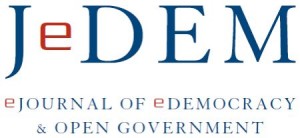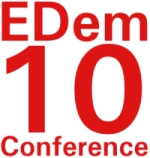Only articles in with the "CfP" tag are displayed
To display all articles click
here.
 |
17. June 2010 – 15:19 by Centre for E-Government
|
 Extended Call For Papers - eJournal of eDemocracy and Open Government (JeDEM)
Extended Call For Papers - eJournal of eDemocracy and Open Government (JeDEM)
Issue 3/ September 2010
Special Issue in Collaboration with
PEP-NET: Sustainable eParticipation
Guest Editors
- Rolf Luehrs (PEP-NET, TuTech Innovation GmbH, D)
- Francesco Molinari (SmartIntuitions Ltd., CY)
The eJournal of eDemocracy and Open Government addresses the theory and practice in the areas of eDemocracy and Open Government as well as eGovernment, eParticipation, eDeliberation and eSociety. The aim is to impact the quality, visibility, efficiency and use of research and work in eDemocracy, Open Government and related fields.
Call for Papers
The past decade has seen a significant increase in the number, variety and quality of eParticipation trials, particularly in Western and Southern European countries. The impulse of the European Parliament and the financial support by the Commission have been instrumental in establishing a pan-European community of practice, made up of academia, governments and solution providers from virtually all EU Member States.
Read the rest of this entry »
Posted in ICT, News, experince, good practice, open data | No Comments »
 |
4. November 2009 – 18:15 by University Bergamo
|
ECPR Standing Group on Forms of Participation
Conference calls
Networking Democracy? New media innovations in participatory politics
A three day Symposium to be held at Babes-Bolyai University, Cluj, Romania 25-27 June 2010.
Website: https://www.brisc.info/NetDem/index.php?page=networking-democracy
Democratic politics worldwide are increasingly being conducted and re-configured through the domain of digital communications networks. The socio-technical developments, such as Web 2.0, facilitating these media-saturated public spheres are in little doubt. What is highly contested however is the interpretation of what these profound changes offer for democratic governance in the twenty-first century. At its heart is the recognition that these new media networks are themselves the crucial site for a historical confrontation between opposing political and/or business interests and discourses intent upon forging new forms of social relations.
We will address questions such as:
• What new forms and relations of power are produced in the digital network society?
• Who are the key social actors shaping the new public sphere and what are their respective strategies, framing, and repertoires of action?
• What is the democratic potential of Web 2.0 applications such as social networking, blogging and twittering?
• What empirical evidence do we have to understand and assess these developments?
• How is networked democracy influencing new democratic societies?
• What are its consequences for human rights, social sorting, migration, e-government, community politics, surveillance, protest, participation, culture, identity, mobilization, representation, nationalism, security, citizen journalism, trust, regulation, both exogenous and self-regulation and much more?
Speakers include:
• W. Lance Bennett, University of Washington, USA,
• Bruce Bimber, University of California at Santa Barbara, USA
• Donatella Della Porta, European University Institute, Italy
• William H. Dutton, Oxford Internet Institute, UK
• Brian Loader, University of York, UK
• Rodica Mocan, Babes-Bolyai University, Romania
We invite papers from all disciplines which have addressed these topics. Important dates: Submission deadline: 7 December 2009; Notifications of acceptance: 15 January 2010; Symposium: 25-27 June 2010.
Posted in Events, News | 1 Comment »
 |
20. October 2009 – 15:22 by Centre for E-Government
|
 “A revolution doesn’t happen when a society adopts new tools. It happens when society adopts new behaviours.“ (Clay Shirky)
“A revolution doesn’t happen when a society adopts new tools. It happens when society adopts new behaviours.“ (Clay Shirky)
EDem10
4th International Conference on eDemocracy
6. and 7. May 2010
Danube-University Krems
Call for Papers
Scientific eDemocracy visions and models have been developed since the 1960s, but it is now, during the first decade of the 21st Century, that they are becoming reality, being tested and implemented. Extensive IT provides the necessary basis, but it is not the developments in IT alone that are responsible for successful eDemocracy projects – it is due all those who use and apply them, as they adopt new behaviours and change old ones. The new, digital generation lives and breathes new values: they collaborate, compile content together, share their ideas, create networks on social platforms and organise themselves quickly and simply. The new values held, the new behaviours adopted, the changed mindset, along with improved usability and a still-increasing use of the internet, has led to a rapid and radical change in our society.
The EDem10 focuses on these changes which can be seen occurring in different areas and which are manifest in different way:
- Transparency & Communication (freedom of information, free information access, openness, information sharing, blogging, micro-blogging, social networks, data visualization, eLearning, empowering, …);
- Participation & Collaboration (innovation malls, innovation communities, bottom up, top down, social networks, engagement and accountability, collaborative culture, collaboration between C2C, G2C, …);
- Architecture, Concepts & Effects (access and openness, user generated content, peer production, network effects, power laws, long tail, harnessing the power of the crowd, crowd sourcing, social web, semantic web, …);
- Different Fields: open government initiatives, eDemocracy, eParticipation, eVoting, eDeliberation;
- Approaches and Disciplines: law & legal studies, social sciences, computer sciences, political sciences, psychology, sociology, applied computer gaming and simulation, democratic theory, media and communication sciences;
- Multidisciplinary and Interdisciplinary Approaches;
- Research Methods.
On primary aim is to bring together researchers and practitioners. We would like to invite individuals from academic, applied and practitioner backgrounds as well as public administration offices, public bodies, NGO/NPOs, education institutions and independent organisations to submit their research and project papers.
The main conference language is English; submissions in German (with an abstract in English) are also acceptable.
Further Information:
Posted in Events | No Comments »
 Extended Call For Papers - eJournal of eDemocracy and Open Government (JeDEM)
Extended Call For Papers - eJournal of eDemocracy and Open Government (JeDEM)
 “A revolution doesn’t happen when a society adopts new tools. It happens when society adopts new behaviours.“ (Clay Shirky)
“A revolution doesn’t happen when a society adopts new tools. It happens when society adopts new behaviours.“ (Clay Shirky)







